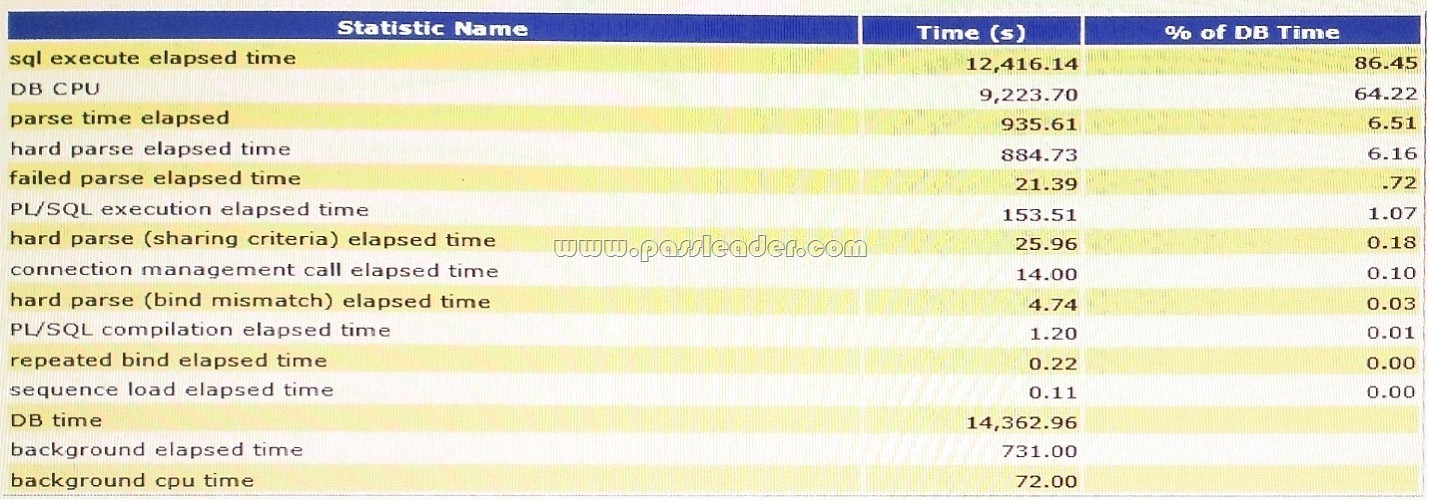PassLeader now are offering 100% pass ensure 1Z0-064 dumps! All 1Z0-064 exam questions have been updated with correct answers, welcome to download the newest PassLeader 1Z0-064 VCE dumps and PDF dumps: https://www.passleader.com/1z0-064.html (90 Q&As)
BTW: Download PassLeader 1Z0-064 dumps from Google Drive for free: https://drive.google.com/open?id=1ZJ8IAgupu8ZxjCosUsnrIai3zsPlhNd2
QUESTION 25
In your database, the locally managed tablespace, USERS, has the default space usage alert set to 85% for the warning level and 97% for the critical level. Which two statements are true? (Choose two.)
A. Alerts are recorded in both Oracle Enterprise Manager Cloud Control and DBA_OUTSTANDING_ALERTS only when the critical threshold is exceeded.
B. Alert settings for the warning and critical levels must be disabled before taking the USERS tablespace offline.
C. Alerts that are triggered are automatically recorded in DBA_ALERT_HISTORY after they are cleared.
D. Alerts are triggered when the space usage reaches the warning level, again when it reaches the critical level, and yet again when the space usage falls below the critical level.
Answer: BC
QUESTION 26
Examine the Time Model Statistics section of an AWR report:
Which two inferences can be definitely derived from this section? (Choose two.)
A. The available CPU resources were not utilized to their maximum capacity.
B. All sequence numbers used during this AWR time interval were cached.
C. A large number of connected user sessions were idle.
D. New child cursors were created because of new bind values or usage of literal values as well as different bind types or sizes.
E. The DB CPU time was not spent exclusively for processing SQL statements.
Answer: DE
QUESTION 27
You observe that queries are performing poorly on the SALES_RECORDS table in your database. On investigation, you find that at the end of each day the contents of the SALES_RECORDS table are moved to the SALES_HISTORY table. The delete operations cause the table to be sparsely populated. The SALES_RECORDS table is created in a tablespace using Automatic Segment Space Management (ASSM) and row movement is enabled. The table must be accessible 24×7. Which two tasks would you recommend to improve the performance? (Choose two.)
A. Perform EXPORT, DROP, and IMPORT operations on the SALES_RECORDS table.
B. Shrink the SALES_RECORDS table by using the ALTER TABLE…SHRINK SPACE command.
C. Move the SALES_RECORDS table to a different location by using the ALTER TABLE…MOVE command.
D. Deallocate the space in the SALES_RECORDS table by using the ALTER TABLE…DEALLOCATE UNUSED command.
E. Move the SALES_RECORDS table to a tablespace by using manual segment space management.
F. Reorganize the SALES_RECORDS table online by using the DBMS_REDEFINITION package.
Answer: BD
QUESTION 28
Which three statements are true about using Real-Time Database Operations? (Choose three.)
A. The STATISTICS_LEVEL initialization parameter must be set to ALL to enable automatic SQL monitoring for all long-running queries.
B. The CONTROL_MANAGEMENT_PACK_ACCESS initialization parameter must be set to DIAGNOSTIC+TUNUNG to use Real-Time Database Operations.
C. The STATISTICS_LEVEL initialization parameter can be set to TYPICAL or ALL to enable Real-Time Database Operations.
D. Real-Time Database Operations can be enabled only at the system level.
E. Real-Time Database Operations can be created by using the DBMS_MONITOR or DBMS_SESSION packages.
F. Database operation monitoring starts automatically when a database operation consumes at least five seconds of the CPU or I/O time in a single execution.
Answer: BCF
QUESTION 29
Which three actions should you perform to reduce shared pool fragmentation and avoid the “ORA-04031: unable to allocate … bytes of shared memory” error for the shared pool? (Choose three.)
A. Configure the Server Result Cache.
B. Configure shared server mode.
C. Identify the packages or procedures that are causing the “ORA-04031: unable to allocate … bytes of shared memory” error and use the DBMS_SHARED_POOL.KEEP to keep them in the shared pool.
D. Use DBMS_SHARED_POOL.KEEP to keep the SYS.STANDARD, SYS.DBMS_STANDARD, and SYS.DIUTIL packages and frequently executed compiled triggers.
E. Use more anonymous procedures.
F. Standardize the type, size, and naming conventions for bind variables and spacing conventions for SQL statements and PL/SQL blocks.
Answer: BCD
QUESTION 30
You are administering a database that supports an OLTP workload. RESULT_CACHE_MODE is set to the default value and a result cache is configured for the instance. Multiple sessions execute syntactically similar queries without dblinks, containing functions and expressions, on tables with no DML activity. Some users complain about poor performance of these queries. You investigate and find that the queries are frequently performing physical I/O, even though the results fetched by the queries are similar. Which two actions do you recommend to overcome the problem affecting these queries? (Choose two.)
A. Set the RESULT_CAHCE_MODE parameter to FORCE for the instance.
B. Use the result cache hint in the queries.
C. Use bind variables for similar queries instead of literals.
D. Set the RESULT_CACHE_REMOTE_EXPIRATION parameter to a nonzero value.
E. Configure the KEEP pool and cache the queried tables used in the KEEP pool.
Answer: AB
PassLeader now are offering 100% pass ensure 1Z0-064 dumps! All 1Z0-064 exam questions have been updated with correct answers, welcome to download the newest PassLeader 1Z0-064 VCE dumps and PDF dumps: https://www.passleader.com/1z0-064.html (90 Q&As)
BTW: Download PassLeader 1Z0-064 dumps from Google Drive for free: https://drive.google.com/open?id=1ZJ8IAgupu8ZxjCosUsnrIai3zsPlhNd2